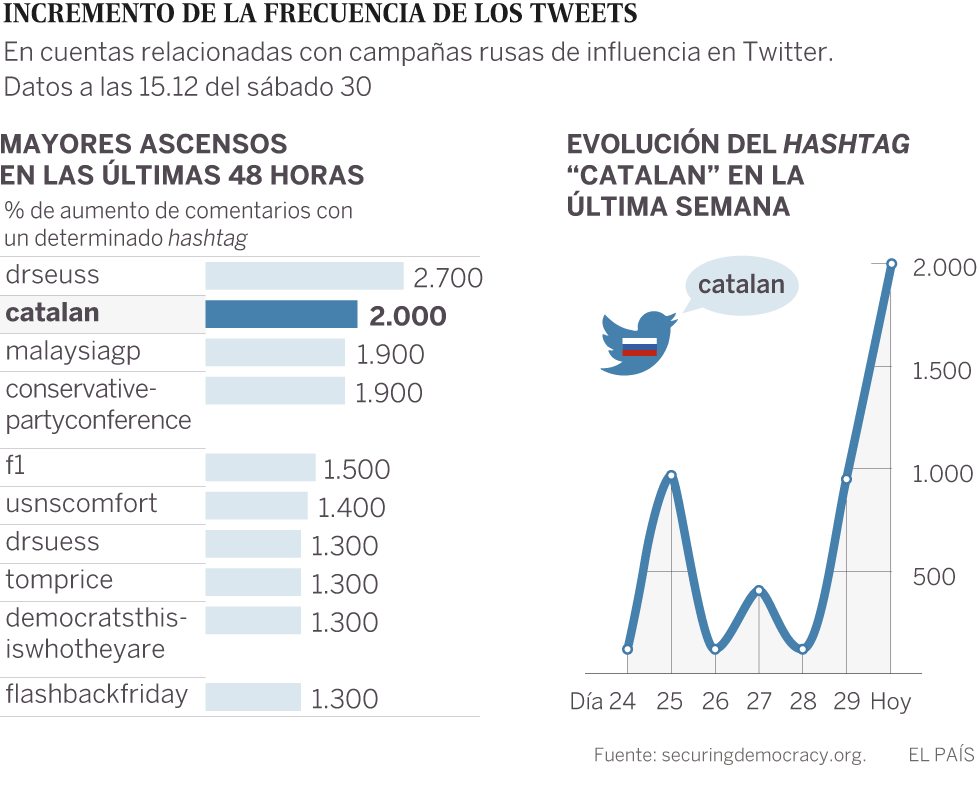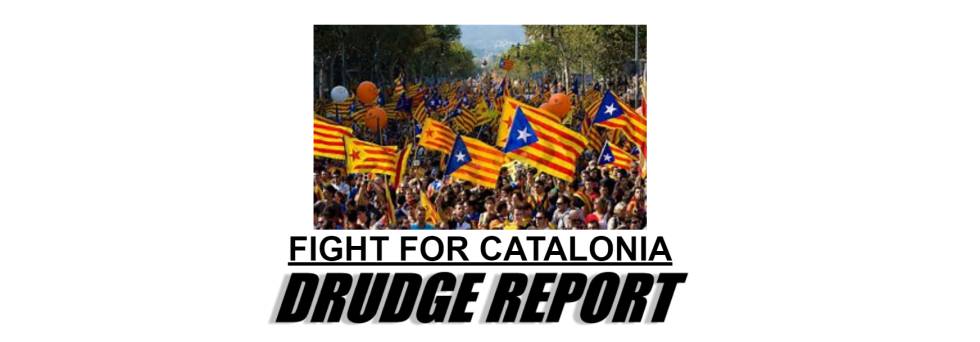Pro-Russian networks see 2,000% increase in activity in favor of Catalan referendum
The Russian meddling machine has intensified its efforts on social media to deepen divisiveness in the final hours before the Catalan independence referendum of Sunday. Pro-Kremlin Twitter accounts increased their mentions of the Catalan crisis by 2,000%, according to social conversation analysis tools. The attempt to hold an independence referendum has gotten star treatment not only in channels directly funded by the Russian government, but also from accounts that trade in conspiracy theories and helped Donald Trump become the US president.

One of the biggest cogs in the Trump machine is InfoWars, an empire led by Alex Jones, a known instigator of conspiracy theories. On Wednesday, broadcaster David Knight falsely claimed that 700 mayors had been arrested in Spain and that the government is preparing an invasion of Catalonia by sea. He then criticized Trump for not supporting secession because “this country [the United States] was founded on the right of self-government and self-determination.”
On Thursday, Knight was at it again, this time to comment on information published by EL PAÍS on Russian interference in Catalonia: “If the Russians control social media and if the Russians controlled Facebook, as we are being told now by the Democrats, Hillary Clinton and even the Spanish government… then why are they banning Facebook?” The InfoWars site, where these videos and podcasts are broadcast, has more than 6.5 million unique users per month, according to the company itself.
The Drudge Report, a tabloid website equally faithful to Trump, opened its evening edition with a photo from the Diada, or Catalan National Day, covered in independence flags and the generic title “Fight for Catalonia.” On September 20, the media think tank Media Matters referred to Matt Drudge, director of that portal, as a “pipeline for Russian propaganda” in the US. According to InterMarkets, The Drudge Report has 19 million unique users per month.

The idea of a disintegrating Spain is part of the anti-EU rhetoric that both Trump, and the nationalist groups that support him, have exhibited. One of those anonymous accounts, @WillyClicks, with 23,000 followers on Twitter, said on Thursday: “Franco is dead. Spain is a failed state. Stop delaying its dissolution. Support Catalonia!”
The 2,000% increase in Catalonia-related online activity in Russia detected by the tool Hamilton 68, not only involves anonymous accounts, but also a sudden interest in this crisis by famous social media users from the US, including Jack Posobiec, a far-right agitator who has been retweeted by Trump himself. These past couple of days Posobiec has shared links about the measures taken to prevent the vote in Catalonia.
The great provocateurs in Trump’s America have thus joined media outlets that are directly subsidized by the Russian government, such as Sputnik or RT. The latter has notably intensified its production of content about the Catalan crisis on its networks, both in English and Spanish, with headlines such as "Echoes of Franco in Spain’s ‘political repression’ of Catalonia.” On Friday, RT’s Spanish edition published 11 articles on the subject. In the past, this outlet has been involved in other controversies, particularly over its role in promoting Trump during the US campaign.
According to a US intelligence report released in January, RT is the Kremlin’s main international propaganda channel and directly “staffs RT and closely supervises RT's coverage, recruiting people who can convey Russian strategic messaging because of their ideological beliefs.” The RT editor-in-chief is Margarita Simonyan, who “has close ties to top Russian Government officials,” according to the US intelligence report. On Wednesday, Simonyan shared a video in Russian on Twitter (@M_Simonyan, 540,000 followers) criticizing EL PAÍS’ information, adding the sarcastic message: “In Catalonia, we have also hacked and manipulated, etcetera.”
RT maintains a close collaboration with Julian Assange, as the US report highlights. These ties have been evident in the case of Catalonia. According to the same report, RT’s editor-in-chief met the Wikileaks founder at the Ecuadorian embassy in London in 2013. “Russian media subsequently announced that RT had become ‘the only Russian media company’ to partner with WikiLeaks,” according to the report.
Accordingly, Assange has intensified efforts to make the Catalan crisis a global trend on social networks, always from his particular point of view. On Friday, he accused Spain and Prime Minister Mariano Rajoy of having triggered the first world war through Internet censorship. His message was shared 14,000 times on Twitter. Before the Civil Guard took action to prevent an electronic vote tally, Assange himself also recommended via Twitter sending in the ballots via Telegram, an application developed by a company based in Russia.
Ecuador, which hosts Assange at its embassy in London, believes that taking sides in the Spanish crisis violates the terms of his political asylum. Ecuadorian President Lenin Moreno revealed on CNN Wednesday that he has asked Assange, “in a cordial way, to stop commenting on the politics of Ecuador or its allies, because his condition does not allow it.” Assange responded on Twitter on Thursday: “If President Moreno wants to gag my reporting of human rights abuses in Spain he should say so explicitly--together with the legal basis.”
The framework of Russian influence has not only provided support for independence in the form of propaganda. On Tuesday, EL PAÍS, quoting sources in the Civil Guard, revealed that several Russian hackers have helped to maintain census websites active for the Catalan regional government. Such logistical assistance may be more necessary than ever, given that the Civil Guard shut down electronic vote-counting in the regional government’s telecommunications center.
English version by Debora Almeida.














.png)



























No hay comentarios:
Publicar un comentario